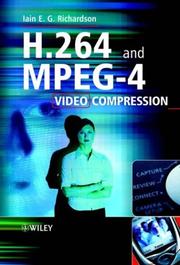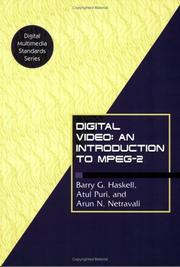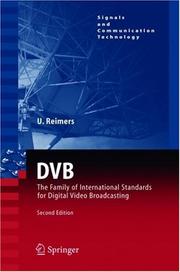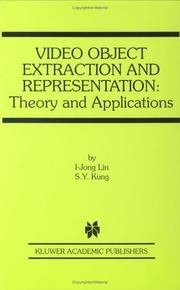| Listing 1 - 9 of 9 |
Sort by
|

ISBN: 0130616214 Year: 2002 Publisher: Upper Saddle River Prentice Hall
Abstract | Keywords | Export | Availability | Bookmark
 Loading...
Loading...Choose an application
- Reference Manager
- EndNote
- RefWorks (Direct export to RefWorks)
MPEG (Video coding standard) --- Video compression --- -Video data compression --- Image compression --- Motion Picture Experts Group standard --- Digital video --- Standards --- Standards. --- -Standards --- MPEG (Video coding standard).

ISBN: 0470010118 9780470010112 Year: 2006 Publisher: Chichester Wiley
Abstract | Keywords | Export | Availability | Bookmark
 Loading...
Loading...Choose an application
- Reference Manager
- EndNote
- RefWorks (Direct export to RefWorks)
Rik Van de Walle is the first to document MPEG-21, a current & hot topic', which is stimulating interest in the multimedia community and quickly becoming a standardized technology. Multimedia technology provides the different players in the value and delivery chain with an excess of information and services. However, no complete solutions exist that allow different communities (content, financial, communication, computer and consumer electronics and their customers), each with their own models, rules, procedures, interests and content formats, to interact efficiently using this complex infrastructure. Developing a common (big picture) MPEG-21 multimedia framework would facilitate co-operation between sectors and support a more efficient implementation and integration of the different models, resulting in an enhanced user experience. Thus, MPEG-21, the multimedia framework, seeks to fill the gaps and create the big picture of multimedia standards. It aims to guarantee interoperability by focusing on how the elements of a multimedia application infrastructure should relate, integrate and interact. Finally, where open standards for elements are missing, MPEG-21 is providing new technologies to fill the gaps. Serving as a timely and important reference for a burgeoning market, this indispensable text is edited by multimedia experts and_is an_invaluable_reference for_all those in the industry. MPEG-21 guarantees interoperability between multimedia systems by focusing on the elements of a multimedia application infrastructure. Presents a comprehensive overview of the technical issues, which MPEG-21 has standardised including, DID (Digital Item Declaration), DII (Digital Item Identification) and file format and those already in a mature state (e.g. MPEG-21 Digital Item Adaption). First book to deal with MPEG-21, which is a hot multimedia topic. Gained significant interest from the multimedia community. Includes chapters by leading experts in the field who have contr
Computer animation --- Digital video. --- MPEG (Video coding standard). --- Standards. --- Digital video --- MPEG (Video coding standard) --- Motion Picture Experts Group standard --- Video compression --- Digital motion video --- PC video --- Video, Digital --- Computer graphics --- Digital media --- Image processing --- Multimedia systems --- Standards --- Digital techniques

ISBN: 0470848375 Year: 2003 Publisher: Chichester Wiley
Abstract | Keywords | Export | Availability | Bookmark
 Loading...
Loading...Choose an application
- Reference Manager
- EndNote
- RefWorks (Direct export to RefWorks)
multimedia --- Artificial intelligence. Robotics. Simulation. Graphics --- videocompressie --- MPEG (motion pictures expert group) --- MPEG (Video coding standard) --- Video compression --- MPEG (Video coding standard). --- Digital video --- Multimedia systems --- Computer-based multimedia information systems --- Multimedia computing --- Multimedia information systems --- Multimedia knowledge systems --- Information storage and retrieval systems --- Motion Picture Experts Group standard --- Standards --- Multimedia systems. --- Standards.
Book
ISBN: 1484287010 1484287002 Year: 2023 Publisher: New York, New York : Apress,
Abstract | Keywords | Export | Availability | Bookmark
 Loading...
Loading...Choose an application
- Reference Manager
- EndNote
- RefWorks (Direct export to RefWorks)
Create, edit, modify and convert multimedia files using FFmpeg, the most versatile open source audio and video processing tool available for Linux, Mac and Windows users. After reading this book, you will be able to work with video and audio files, images, text, animations, fonts, subtitles and metadata like a pro. It begins with a simple introduction to FFmpeg executables — ffmpeg, ffprobe and ffplay, and explains how you can use them to process multimedia containers, streams, audio channels, maps and metadata. It then describes how you can easily edit, enhance and convert audio, video, image and text files. There are dedicated chapters for filters, audio, subtitles and metadata, as well as FFmpeg tips and tricks. Sample lists of FFmpeg filters, encoders, decoders, formats and codecs are also available as appendices. Quick Start Guide to FFmpeg is for anyone who needs to edit or process multimedia files including studio professionals, broadcast personnel, content creators, podcasters, librarians, archivists and webmasters. It will be indispensable for those wanting to process a variety of multimedia files from the command line and inside shell scripts or custom-built software. You will: Convert from one format to another e.g. video-to-video, video-to-audio, video-to-image, image-to-video, video-to-animation, animation-to-video, text-to-audio, text-to-video Edit video files by cutting them with and without re-encoding, appending, resizing, changing frame rate and aspect ratio, mixing in audio Use filters to rotate, flip, crop, overlay (side-by-side or inset), remove logos, blur, smooth and sharpen, apply transitions as well as speed up or down playback Edit audio files by changing, normalizing or compressing volume, mixing and splitting channels and detecting silence. Also, learn to generate waveforms as video or images Add subtitles, place them anywhere on the screen, use custom fonts and colors, and use different languages Learn how to import, export and remove metadata, add MP3 tags (including album art), set global and stream-specific metadata, export and remove metadata Automate your FFmpeg tasks.
Open source software. --- Multimedia systems. --- Open Source. --- Multimedia Information Systems. --- Computer-based multimedia information systems --- Multimedia computing --- Multimedia information systems --- Multimedia knowledge systems --- Information storage and retrieval systems --- Free software (Open source software) --- Open code software --- Opensource software --- Computer software --- MPEG (Video coding standard) --- Motion Picture Experts Group standard --- Digital video --- Video compression --- Standards --- Multimedia systems --- FFmpeg.

ISBN: 9780412084119 0412084112 0306469820 9786610205578 0585431477 1280205571 Year: 1997 Publisher: New York (N.Y.) : Chapman and Hall,
Abstract | Keywords | Export | Availability | Bookmark
 Loading...
Loading...Choose an application
- Reference Manager
- EndNote
- RefWorks (Direct export to RefWorks)
Digital Video offers comprehensive coverage of the MPEG-2 audio/visual digital compression standard. The treatment includes the specifics needed to implement an MPEG-2 Decoder, including the syntax and semantics of the coded bitstreams. Since the MPEG-2 Encoders are not specified by the standard, and are actually closely held secrets of many vendors, the book only outlines the fundamentals of encoder design and algorithm optimization.
Digital video. --- Video compression --- Coding theory. --- MPEG (Video coding standard) --- Vidéo numérique --- Codage --- MPEG (Norme de codage vidéo) --- Standards. --- Coding theory --- Digital video --- -MPEG (Video coding standard) --- datacompressie --- beeldregistratie --- multimedia --- mpeg --- video's --- HDTV --- televisie --- Motion Picture Experts Group standard --- Video data compression --- Image compression --- Digital motion video --- PC video --- Video, Digital --- Computer graphics --- Digital media --- Image processing --- Multimedia systems --- Data compression (Telecommunication) --- Digital electronics --- Information theory --- Machine theory --- Signal theory (Telecommunication) --- Computer programming --- Standards --- Digital techniques --- MPEG (Video coding standard). --- Microprogramming . --- Signal processing. --- Image processing. --- Speech processing systems. --- Electrical engineering. --- Control Structures and Microprogramming. --- Signal, Image and Speech Processing. --- Electrical Engineering. --- Electric engineering --- Engineering --- Computational linguistics --- Electronic systems --- Modulation theory --- Oral communication --- Speech --- Telecommunication --- Singing voice synthesizers --- Pictorial data processing --- Picture processing --- Processing, Image --- Imaging systems --- Optical data processing --- Processing, Signal --- Information measurement --- Video compression - Standards.
Book
ISBN: 1441961836 9786613444158 1283444151 1441961844 1489987290 Year: 2012 Publisher: New York : Springer,
Abstract | Keywords | Export | Availability | Bookmark
 Loading...
Loading...Choose an application
- Reference Manager
- EndNote
- RefWorks (Direct export to RefWorks)
More and more information, audio and video but also a range of other information type, is generated, processed and used by machines today, even though the end user may be a human. The result over the past 15 years has been a substantial increase in the type of information and change in the way humans generate, classify, store, search, access and consume information. Conversion of information to digital form is a prerequisite for this enhanced machine role, but must be done having in mind requirements such as compactness, fidelity, interpretability etc. This book provides an overview of the basic technology and mechanisms underpinning the operation of MPEG standards. It is a valuable reference for those making decisions in products and services based on digital media, those with general background, engaged in studies or developments of MPEG-related implementations, and those curious about MPEG and its role in the development of successful, standard technologies. Offers an overview of what’s behind MP3, digital television, online movies and why these innovations changed the world; Provides a comprehensive treatment of all aspects of signal digitization; Presents not only the state-of-the-art, but also what are the drivers of what is coming next and what is developing in key R&D labs; Provides examples of new human sense experiences for all sorts of users and new business opportunities these offer.
Digital media -- Standards. --- MP3 (Audio coding standard). --- MPEG (Video coding standard). --- MPEG (Video coding standard) --- MPEG-4 AAC (Audio coding standard) --- Electronic data processing --- Electronic information resources --- Engineering & Applied Sciences --- Electrical & Computer Engineering --- Electrical Engineering --- Applied Physics --- Telecommunications --- Digital media. --- Motion Picture Experts Group standard --- Electronic media --- New media (Digital media) --- Engineering. --- Computer-aided engineering. --- Electronic circuits. --- Signal, Image and Speech Processing. --- Circuits and Systems. --- Computer-Aided Engineering (CAD, CAE) and Design. --- Digital video --- Video compression --- Mass media --- Digital communications --- Online journalism --- Standards --- Systems engineering. --- Computer aided design. --- CAD (Computer-aided design) --- Computer-assisted design --- Computer-aided engineering --- Design --- Engineering systems --- System engineering --- Engineering --- Industrial engineering --- System analysis --- Design and construction --- Signal processing. --- Image processing. --- Speech processing systems. --- CAE --- Electron-tube circuits --- Electric circuits --- Electron tubes --- Electronics --- Computational linguistics --- Electronic systems --- Information theory --- Modulation theory --- Oral communication --- Speech --- Telecommunication --- Singing voice synthesizers --- Pictorial data processing --- Picture processing --- Processing, Image --- Imaging systems --- Optical data processing --- Processing, Signal --- Information measurement --- Signal theory (Telecommunication) --- Data processing

ISBN: 354043545X 3642078079 3662115778 Year: 2005 Publisher: Berlin Springer
Abstract | Keywords | Export | Availability | Bookmark
 Loading...
Loading...Choose an application
- Reference Manager
- EndNote
- RefWorks (Direct export to RefWorks)
The Digital Video Broadcasting Project (DVB) is an industry-led consortium of over 300 broadcasters, manufacturers, network operators, software developers, regulatory bodies and others in over 40 countries committed to designing global standards for the delivery of digital television and data services. Ulrich Reimers is the chairman of its Technical Module and is therefore able to provide up-to-date insider information. This second edition of the book was revised and substantially extended by a new team of authors led by Professor Reimers. New chapters include Data Broadcasting, Solutions for Interactive Services, and the promising Multimedia Home Platform (MHP). Substantially revised are those on MPEG-2 systems and multiplexing, the standard for terrestrial transmission and its decoding technique, and the first chapter, the introduction to the DVB world.
DVB-T (digital video broadcasting) --- Computer architecture. Operating systems --- Information systems --- Electronics --- digitalisering --- Artificial intelligence. Robotics. Simulation. Graphics --- TVD (digitale televisie) --- Digital television --- MPEG (Video coding standard) --- Television broadcasting. --- Standards. --- MPEG (Video coding standard). --- Television broadcasting --- Telecasting --- Television --- Television industry --- Motion Picture Experts Group standard --- Standards --- Broadcasting --- Mass media --- Digital video --- Video compression --- Digital communications --- Digital media --- Signal processing. --- Image processing. --- Speech processing systems. --- Input-output equipment (Computers). --- Microwaves. --- Optical engineering. --- Electrical engineering. --- Signal, Image and Speech Processing. --- Input/Output and Data Communications. --- Microwaves, RF and Optical Engineering. --- Communications Engineering, Networks. --- Electric engineering --- Engineering --- Mechanical engineering --- Hertzian waves --- Electric waves --- Electromagnetic waves --- Geomagnetic micropulsations --- Radio waves --- Shortwave radio --- Computer hardware --- Computer I/O equipment --- Computers --- Electronic analog computers --- Electronic digital computers --- Hardware, Computer --- I/O equipment (Computers) --- Input equipment (Computers) --- Input-output equipment (Computers) --- Output equipment (Computers) --- Computer systems --- Computational linguistics --- Electronic systems --- Information theory --- Modulation theory --- Oral communication --- Speech --- Telecommunication --- Singing voice synthesizers --- Pictorial data processing --- Picture processing --- Processing, Image --- Imaging systems --- Optical data processing --- Processing, Signal --- Information measurement --- Signal theory (Telecommunication) --- Input-output equipment
Book
ISBN: 9780387710433 0387710426 9780387710426 1441943765 9786611953980 1281953989 0387710434 Year: 2008 Publisher: New York ; London : Springer,
Abstract | Keywords | Export | Availability | Bookmark
 Loading...
Loading...Choose an application
- Reference Manager
- EndNote
- RefWorks (Direct export to RefWorks)
The MPEG committee standardized the MPEG AVC (H.264) video coding standard in May 2003. The standard has since seen strong interest and adoption from the industry. A competing standard developed by Microsoft, referred to as VC-1, was standardized in SMPTE in April 2006. VC-1 is essentially a standardized version of Microsoft's Windows Media Video (WMV-9). Both H.264 and VC-1 are highly efficient compression standards that enable high-quality video services such as IPTV and Blu-ray Disc. H.264 and VC-1 are both mandated for high definition video services on Blu-ray Disc. These two standards are expected to form the basis for a new generation of high-quality broadband video services. The VC-1 and H.264 Video Compression Standards for Broadband Video Services covers these video coding standards, as well as issues in broadband video delivery. No other book about H.264 or VC-1 covers the standards in such detail. This book interprets the complex standards specifications and makes these new technologies accessible. Both authors have more than 12 years experience working on video compression and communications. The VC-1 and H.264 Video Compression Standards for Broadband Video Services is designed for researchers and a professional audience, including video engineers, and practitioners in consumer electronics, telecommunications and media compression industries. This book is also suitable as a secondary text or reference for advanced-level students in computer science and electrical engineering. .
Engineering. --- Signal, Image and Speech Processing. --- Communications Engineering, Networks. --- Multimedia Information Systems. --- Computer Imaging, Vision, Pattern Recognition and Graphics. --- Computer Communication Networks. --- Information Systems Applications (incl.Internet). --- Information systems. --- Multimedia systems. --- Computer vision. --- Telecommunication. --- Ingénierie --- Réseaux d'ordinateurs --- Multimédia --- Vision par ordinateur --- Télécommunications --- Broadband communication systems. --- MPEG (Video coding standard). --- Video compression -- Standards. --- Electrical Engineering --- Electrical & Computer Engineering --- Engineering & Applied Sciences --- Information storage and retrieval systems --- Systèmes d'information --- MPEG (Video coding standard) --- Digital video --- Standards. --- Motion Picture Experts Group standard --- Computer communication systems. --- Multimedia information systems. --- Computer graphics. --- Electrical engineering. --- Information Systems Applications (incl. Internet). --- Electric engineering --- Engineering --- Automatic drafting --- Graphic data processing --- Graphics, Computer --- Computer art --- Graphic arts --- Electronic data processing --- Engineering graphics --- Image processing --- Computer-based multimedia information systems --- Multimedia computing --- Multimedia information systems --- Multimedia knowledge systems --- Communication systems, Computer --- Computer communication systems --- Data networks, Computer --- ECNs (Electronic communication networks) --- Electronic communication networks --- Networks, Computer --- Teleprocessing networks --- Data transmission systems --- Digital communications --- Electronic systems --- Information networks --- Telecommunication --- Cyberinfrastructure --- Network computers --- Construction --- Industrial arts --- Technology --- Digital techniques --- Distributed processing --- Video compression --- Standards --- Machine vision --- Vision, Computer --- Artificial intelligence --- Pattern recognition systems --- Electric communication --- Mass communication --- Telecom --- Telecommunication industry --- Telecommunications --- Communication --- Information theory --- Telecommuting --- Optical data processing. --- Application software. --- Application computer programs --- Application computer software --- Applications software --- Apps (Computer software) --- Computer software --- Optical computing --- Visual data processing --- Bionics --- Integrated optics --- Photonics --- Computers --- Optical equipment

ISBN: 1280206373 9786610206377 0306470373 0792379748 Year: 2000 Publisher: Boston, Mass. : Kluwer Academic Publisher,
Abstract | Keywords | Export | Availability | Bookmark
 Loading...
Loading...Choose an application
- Reference Manager
- EndNote
- RefWorks (Direct export to RefWorks)
“If you have built castles in the air, your work need not be lost; that is where they should be. Now put the foundations under them. ” - Henry David Thoreau, Walden Although engineering is a study entrenched firmly in belief of pr- matism, I have always believed its impact need not be limited to pr- matism. Pragmatism is not the boundaries that define engineering, just the (sometimes unforgiving) rules by which we sight our goals. This book studies two major problems of content-based video proce- ing for a media-based technology: Video Object Plane (VOP) Extr- tion and Representation, in support of the MPEG-4 and MPEG-7 video standards, respectively. After reviewing relevant image and video p- cessing techniques, we introduce the concept of Voronoi Ordered Spaces for both VOP extraction and representation to integrate shape infor- tion into low-level optimization algorithms and to derive robust shape descriptors, respectively. We implement a video object segmentation system with a novel surface optimization scheme that integrates Voronoi Ordered Spaces with existing techniques to balance visual information against predictions of models of a priori information. With these VOPs, we have explicit forms of video objects that give users the ability to - dress and manipulate video content. We outline a general methodology of robust data representation and comparison through the concept of complex partitioning mapped onto Directed Acyclic Graphs (DAGs).
Digital video. --- MPEG (Video coding standard) --- Image processing --- Directed graphs. --- Digital techniques. --- Computer vision. --- Computer engineering. --- Computer graphics. --- Multimedia systems. --- Image Processing and Computer Vision. --- Signal, Image and Speech Processing. --- Electrical Engineering. --- Computer Graphics. --- Multimedia Information Systems. --- Optical data processing. --- Signal processing. --- Image processing. --- Speech processing systems. --- Electrical engineering. --- Multimedia information systems. --- Computer-based multimedia information systems --- Multimedia computing --- Multimedia information systems --- Multimedia knowledge systems --- Information storage and retrieval systems --- Automatic drafting --- Graphic data processing --- Graphics, Computer --- Computer art --- Graphic arts --- Electronic data processing --- Engineering graphics --- Electric engineering --- Engineering --- Computational linguistics --- Electronic systems --- Information theory --- Modulation theory --- Oral communication --- Speech --- Telecommunication --- Singing voice synthesizers --- Pictorial data processing --- Picture processing --- Processing, Image --- Imaging systems --- Optical data processing --- Processing, Signal --- Information measurement --- Signal theory (Telecommunication) --- Optical computing --- Visual data processing --- Bionics --- Integrated optics --- Photonics --- Computers --- Digital techniques --- Optical equipment --- Digraphs (Graph theory) --- Oriented graphs --- Graph theory --- Digital image processing --- Digital electronics --- Motion Picture Experts Group standard --- Digital video --- Video compression --- Digital motion video --- PC video --- Video, Digital --- Computer graphics --- Digital media --- Multimedia systems --- Standards
| Listing 1 - 9 of 9 |
Sort by
|

 Search
Search Feedback
Feedback About UniCat
About UniCat  Help
Help News
News